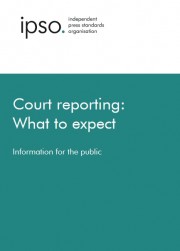 The press watchdog has issued a series of public information sheets explaining what to expect from journalists covering deaths, court cases and inquests.
The press watchdog has issued a series of public information sheets explaining what to expect from journalists covering deaths, court cases and inquests.
The Independent Press Standards Organisation says it wants to help people understand the rules under which newspapers operate and so feel “more confident in engaging with the press.”
It has issued three sets of guidance, covering court reporting, the reporting of deaths and inquests; and how journalists use information from social media.
IPSO says the three topics were chosen because they address issues about which the watchdog receives the most contact from the public.
Among other things, the guidance notes highlight the importance of the principle of open justice and seek to explain why journalists may want to cover court cases and inquests even though the public may not be expecting them to be present.
Charlotte Urwin, head of standards at IPSO, said: “Often, the first time members of the public encounter the press is in relation to a stressful or traumatic event such as the death of a family member or after being caught up in a major incident.
“While some people may wish to speak to journalists, to tell their story, highlight an injustice or gather public support for a campaign, it can be hard to know what to expect.
“These three information sheets are the first of a new series for the public and answer some of the questions we are often asked about these topics and explain how IPSO can help.”
The new information has been developed with IPSO’s Reader’s Advisory Panel, which advises the organisation on its work and wider issues from the perspective of readers and citizens.
The guidance notes can be read here:
Court reporting: What to expect
Press reporting on a death
Journalism and the use of information from social media





 Follow HTFP on Twitter
Follow HTFP on Twitter
in the real world a reporter scurries between courts covering several cases and snatches what he or she can. Or the paper does not bother at all.
Report this comment
I looked at these last week and they are excellent. They will be very handy when dealing with vexatious complaints from some people who, based on numerous stories covered by HTFP, need a little bit of education about how the world works. The well-documented reduction in reporting from courts and inquests appears to be accompanied by an increasing misunderstanding in various quarters – and not just ordinary readers – about what can and cannot be reported. The three PDFs and the vids produced by IPSO will be very useful for pinging out in response to complaints that have no merit.
Report this comment
Ignorant ushers, lawyers and court clerks should have a copy. In the days I managed to get to court they were a nightmare, especially under a tight deadline.
Report this comment
Well I’m flabbergasted, IPSO is supposed to be regulating the press and here they are encouraging the press to engage unlawful activity. and in extreme cases possibly criminal activity. The IPSO guidelines state (at time of writing ) that photographs on social media are OK to be published in Newspapers. This is completely and utterly wrong. There is no exception to copyright for social media works. IPSO seems to be completely confused as to the meaning of public domain. Just because a copyright work is view able by the public , it does not mean that the copyright to that work is in the public domain. Photographs where the copyright is in the public domain are ancient works where the copyright has expired. Copyright lasts for 70 years after the death of the photographer and thus few social media images have copyright in the public domain.
Report this comment
Unfortunately the mouthbreathers who are quick to complain when reports about their favourite nephew/cousin/significant other appear courtesy of a court/inquest report won’t even bother to read this ISPO document (if indeed they can read at all)
Report this comment